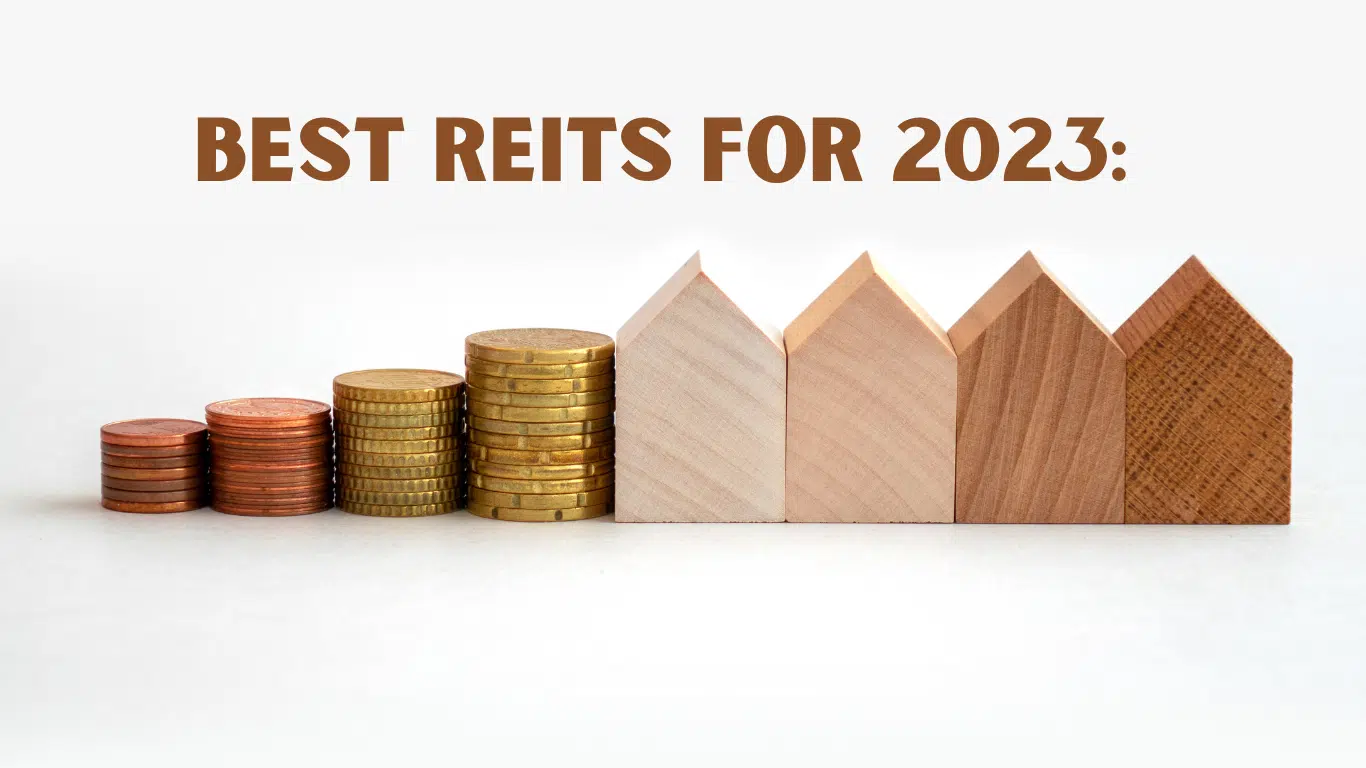If you want to diversify your portfolio and produce passive income, you might consider investing in some of the best REITs for 2023. Real Estate Investment Trusts (REITs) have gained more popularity among investors interested in diversifying their portfolios and generating consistent income. As the name suggests, REITs enable investors to invest in real estate without directly owning tangible properties. Instead, they buy stock in companies that own and manage a portfolio of income-generating assets, including retail malls, office buildings, and apartment complexes. This article will look at the advantages of investing in REITs, the criteria to consider when selecting the best REITs for 2023, and a summary of the Australian REIT industry.
Understanding the Benefits of Investing in REITs

One of the most well-known advantages of investing in REITs is its access to the real estate market. Traditionally, investing in real estate requires significant capital and expertise. However, through REITs, individuals can invest in a diversified portfolio of properties with a relatively small investment. Additionally, REITs offer liquidity, as they are traded on stock exchanges, which allow investors to buy and sell shares quickly. Furthermore, REITs are obligated by law to return a considerable percentage of their profits to shareholders as dividends, making them an appealing alternative for income-focused investors.
Factors to Consider when Choosing the Best REITs for 2023
When selecting the best REITs for 2023, it is essential to consider several factors:
- Investors should analyze the quality and diversification of the REIT’s property portfolio. A well-diversified portfolio can help mitigate risks associated with specific property types or geographical locations.
- Investors should assess the REIT’s historical performance, paying attention to its ability to generate consistent income and deliver value to shareholders.
- It is crucial to evaluate the management team’s experience and track record, as their expertise plays an important role in the success of a REIT.
- Investors should consider the economic and market conditions, as these factors can help the performance of the REITs.
Overview of the Australian REIT Market
The Australian REIT market has shown resilience and growth over the years. Australia has become an attractive destination for real estate investments with a strong economy, stable property market, and attractive tax incentives. The best Australian REITs 2023 comprise of various property types: commercial, industrial, residential, and retail. Some typical Australian REITs that have gained recognition include Goodman Group, Scentre Group, and Dexus. These REITs have demonstrated consistent performance, strong property portfolios, and experienced management teams, making them worth considering for investors in 2023.
Top REITs to Consider for 2023 in Australia
When looking for the best REITs for 2023 in Australia, it is crucial to consider their historical performance, property portfolio, and growth potential. One of the top REITs to consider is Goodman Group. With a focus on industrial properties, Goodman Group has benefited from the growth in the e-commerce and logistics sectors. Scentre Group, the owner of Westfield shopping centres in Australia, is another REIT worth considering. Despite the challenges in the retail industry, Scentre Group has adapted and delivered solid results. Lastly, Dexus, with its diverse property portfolio, including office, industrial, and healthcare properties, has consistently delivered value to its shareholders.
Are REITs a good investment in 2023?
REITs pay out most of their earnings as dividends to shareholders, which have the potential to provide a strong stream of income and capital appreciation. However, whether REITs are a good investment in 2023 depends on factors such as the economic outlook, interest rates, property fundamentals, and valuation metrics.

On the one hand, real estate investment trusts (REITs) have strong balance sheets, minimal leverage, high occupancy rates, and substantial rent increases in some sectors. They also have low values compared to the private real estate market, which may allow investors to purchase excellent REITs at a discount. Slower economic growth, increased inflation, rising interest rates, and reduced demand in some industries, on the other hand, pose problems for REITs. These issues might harm REIT earnings and prices in 2023.
As a result, if you are considering investing in REITs in 2023, you should conduct your research and analysis and, if required, consult an experienced financial adviser. You should also look for REITs with great operational performance, consistent cash flows, attractive dividend yields, and market growth prospects. You may diversify your portfolio among different REIT types and buildings to limit your risk exposure.
Analyzing the Performance of Common Australian REITs
Analyzing the performance of the best REITs for 2023 is essential to make informed investment decisions. Goodman Group, for instance, has shown consistent growth in funds from operations (FFO) and dividends over the years. Its focus on quality industrial properties and strategic locations has positioned it well for future growth. Scentre Group has faced challenges due to the changing retail landscape, but its ability to reposition its shopping centres and attract high-quality tenants has contributed to its stability. Similarly, Dexus has a strong track record of delivering stable income and capital growth, thanks to its diversified property portfolio and active management approach.
- Goodman Business ($GMG) is a comprehensive commercial and industrial property business located in Australia that owns, develops, and manages real estate. This group holds global properties such as warehouses, large-scale logistics facilities, and business and office parks. Its market cap stands at $27.2 billion, and they have a portfolio of 392 properties throughout 17 countries. It also operates a funds management company, which offers third-party money with exposure to high-quality, sector-specific, and diverse real estate assets.
- Scentre Group ($SCG) is a shopping centre firm in Australia and New Zealand that operates retail locations under the Westfield name. It owns and runs a portfolio of 42 Westfield shopping malls worth $51.2 billion. Customers can also use lease options, retail services, brand space, and community participation. It is worth $13.9 billion on the market.
- Dexus ($DXS) is Australia’s leading fully integrated real asset company. Dexus manages a high-quality Australasian real estate and infrastructure portfolio valued at $62.3 billion. It invests in and directly owns $17.8 billion in office, industrial, healthcare, and infrastructure properties and investments in Australia. It also manages an additional $44.5 billion in assets through its fund’s management division, offering third-party capital with exposure to high-quality, sector-specific, and diverse real asset products. It is worth $12.9 billion7 on the market.
Expert Tips for Investing in REITs
Investing in REITs requires careful consideration and research. Here are some expert tips to help you make informed decisions about the best REITs for 2023.

- Conduct thorough research on the REIT’s property portfolio, focusing on diversification and quality.
- Assess the historical performance of the REIT, considering its ability to generate income and deliver consistent returns.
- Evaluate the management team’s expertise and track record in managing real estate assets.
- Consider the economic and market conditions, as they can impact the performance of the REIT.
- Diversify your REIT portfolio to mitigate risks associated with specific property types or geographical locations.
How to Build a Diversified REIT Portfolio?
Building a diversified REIT portfolio is essential to minimize risks and maximize returns. Start by selecting REITs from different property sectors, such as commercial, residential, and industrial. This diversification will help keep your portfolio safe from sector-specific risks. Additionally, consider investing in REITs with properties in different regions or cities to mitigate geographical risks. Lastly, allocate your capital across different REIT types, such as equity and mortgage REITs, to further diversify your portfolio. Review and constantly rebalance your portfolio to align with your investment goals and risk tolerance.
Risks Associated with Investing in REITs
While REITs offer several benefits, it is crucial to be aware of the risks associated with investing in them. One significant risk is the potential volatility of REIT prices, which are influenced by market conditions and investor sentiment. Additionally, changes in interest rates can take a toll on the cost of borrowing for REITs and affect their profitability. Moreover, the performance of REITs is closely tied to the real estate market, making them vulnerable to economic downturns or fluctuations in property values. It is essential to assess and consider these risks when making investment decisions carefully.
Conclusion – Best REITs for 2023:
Investing in REITs may be an attractive option for individuals wishing to diversify their portfolios with real estate. Investors may make well-informed choices by learning about the advantages of investing in REITs, considering criteria such as property portfolio and past performance, and researching the Australian REIT industry.
Research Common Australian REITs, such as Goodman Group, Scentre Group, and Dexus, must be researched to assess their performance and potential for 2023. By following expert tips, building a diversified REIT portfolio, and being aware of associated risks, investors can unlock the potential of REITs and achieve their investment goals.

